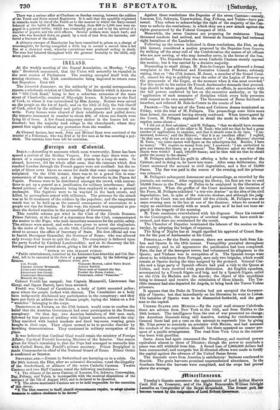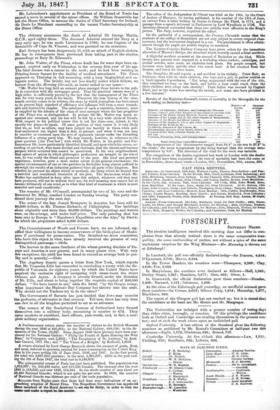Pilistellaneous.
Tuesday's Gazette announces the appointment of Lord Arthur Marcia Cecil Hill as Treasurer, and of the Right Honourable William Sebright Lascelles as Comptroller of the Royal kleusehold. The former post. has become vacant by the resignation of Lord Robert Grosvenor. Mr. Labouchere's appointment as President of the Board of Trade has (*used a move in several of the minor offices. Sir William Somerville has left the Home Office, to assume the duties of Chief Secretary for Ireland; Sir Denis Le Merchant succeeding to the vacant Under-Secretaryship at the Home Office.
The obituary announces the death of Admiral Sir George Martin, G.C.B , aged eighty-three. The deceased Admiral entered the Navy at a very early age; he was made Lieutenant in 1780; he was Captain of the Irresistible off Cape St. Vincent; and was gazetted on six occasions.
Earl Jermyn has been dangerously ill, with an attack of English cholera. He has in consequence been prevented from taking part in the election proceedings at Bury St. Edmund's.
Mr. John Walter, of the Times, whose death has for some days been ex- pected, expired early on Wednesday, in the seventy-first year of his age. The fatal disease was a cancer in the neck; and he had been residing in Printing-house Square for the facility of medical attendance. The Times appeared on Thursday in full mourning, with a long biotraphical and eu- logistic notice. The briefer, but not less kindly notice which follows, we borrow from the Morning Chronicle, as better suited to our space- " Mr. Walter has long held an eminent place amongst those known to the pub- lic in connexion with the newspaper press. That his practical talents were of a high order, is sufficiently proved by the fact that the management of the Times was for very many years in his hands. Whenever the true history of the nine- teenth century comes to be written, the steps by which journalism has been raised to its present high standard of efficiency and influence will form a most remark- able and instructive chapter. The substance of such a narrative, however, must be supplied by the labours of the class of men amongst whom the late proprietor of the Times was so distinguished. In private life Mr. Walter was much re- pected and esteemed, and his loss will be felt by a very wide circle of friends. With respect to his political career this is not the time-nor, indeed, is this exactly the place-to speak. Of some portions of that career it is very likely that we, as well as others, may have judged too harshly in times when poli- tical excitement ran higher than it does at present, and when it was not easy to consider or comment upon the acts of opponents except under the disturbing influence of a strong party bias. We may remark, however, in reference to the great question [the Poor-law] with which Mr. Walter, in his public and Par- liamentarylife, more particularly identified himself, and upon which his errors, ac- cording to our view, were most decided and obstinate, that the sincere and humane purpose which actuated him cannot be questioned. In his own neighbourhood, that sphere of action in which philosophic professions are brought to the truest test, he was really the friend and protector of the poor. His local and personal experience, however, gave a most undue colour to his general conclusions; the special circumstances of one or two parishes in Berkshire being almost suffered to outweigh the results of an induction gathered from all parts of the kingdom. But whether he pursued his object wisely or unwisely, the thing whkh he desired was
• merciful and considerate treatment of the poor. The discussions which Mr. Walter has contributed to keep alive upon this subject, whatever evil they may have produced, will not be without their use; for wed-meaning men cannot tbil to become ultimately of one mind as to what that kind of treatment is which is most merciful and most considerate."
The remains of Mr. O'Connell, accompanied by two of his sons and the Reverend Dr. Miley, reached London on Sunday evening. The party con- tinued their journey the next day.
The estate of the late Joseph Bonaparte in America has been sold for 20,500 dollars, to Mr. Thomas Richards, of Philadelphia. The buildings alone originally cost more than 60,000 dollars. The paintings and statues were, on the average, sold under half price. The only painting that has been sent to Europe is "Napoleon's Expedition over the Alps," by David; for which the proprietors asked 6,000 dollars.
The Commissioners of Woods and Forests have, we are informed, sig- nified their willingness to become conservators of the birth-place of Shake- pere if purchased for preservation. The Stratford-on-Avon committee, who have this object in view, have already received the promise of very distinguished patronage.- Globe.
The harvest in the more Southern of the wheat-growing districts of Eu- rope and America is now general, and in many places over. With very few exceptions, the yield has been found to exceed an average both in qua- lity and in quantity.-Globe.
The Augsburg Gazette quotes a letter from New York, which reports that Mr. Vespasian Ellis has succeeded in concluding a treaty with the Re- public of Venezuela for eighteen years, by which the United States have acquired the exclusive right of navigating with steam-boats the rivers Orinoco and Apure. A company is already formed, under the direction of Mr. Ellis, and about to bring together the requisite capital of 200,000 dollars. "We have learnt to see," adds the letter, "by the Oregon treaty, what importance the Hudson's Bay Company has thrown into the scale. Why should not the Yankees try to do the same?"
The Government of Bavaria has just decided that Jews may exercise the profession of advocates in that country. Till now, there has only been one Jew in all the kingdom permitted to act as an advocate.
The women of the Sonderbund Cantons of Switzerland have formed themselves into a military body-, amounting in number to 672. They carry muskets or carabines, have officers, pass-words, and, in fact, a com- plete military organization.
A Parliamentary return states the number of visiters to the British Museum during the year 1846 at 825,901; to the National Gallery, 608,140; to the Ar mouries of the Tower, 52,287. Since August 1846 three pictures have been pur- chased for the National Gallery: "Philip the Fourth of Spain Hunting the Wild Boar," by Velasquez, cost 2,200E; "The Temptation of St. Anthony," by Anal bale Caracci, 7871 108.; and "The Vision of a Knight," by Raffaelle, 1,0501.
A return obtained by Lord George Bentinck shows the amount of grain, flour, and meal, reduced to quarters, entered for home consumption in the United King dom in the years ending 5th of Jane 1845, 1846, and 1847. In the first period, the total was 2,667,054 quarters; in the next, 1,361,097; while in the year end- ing the 5th of Jane 1847-, the total rose to 9,548,870.
The quinquennial census of Paris has just been published. The population was 1,053,897; viz. 543,492 males, and 510,405 females. The increase over the year 1841 is 118,636; and over 1836, 154,584. In the whole number of men there are 55,460 National Guards; which is not quite ten per cent. In 1836, the number of National Guards was thirteen per cent of the male population.
Accounts from Naples state that there had been some indications of an ap- proaching eruption of Mount Etna. The Neapolitan Government has appointed three members of the Royal Academy to set out for Sicily, in order to visit the enter and make a report on the matter.
The editor of the Independent de lama was tried on the 19th, by the Court of Assizes of Mayenee, for having published, in his number of the 24th of Jane, an extract from a letter written by Junius to George the Third, in 1771, and a passage from a speech delivered in Parliament by Lord Wyndham in 1734. The Attorney-General contended that those two articles were offensive to the King's person. The Jury, however, acquitted the editor.
On the authority of a correspondent, the Preston Chronick stater, that the students of the college of Stonyhurst are not only subject to severe corporal chas- tisement, but the instrument employed is a cat. The punishment is often admin- istered though the pupils are youths verging on manhood.
The Eastern Counties Railway Company have given orders for the immediate alteration of Manger's Bridge, the structure which recently caused a fatal accident.
A frightful accident occurred at the arsenal of Rochefort on the 21st. While twenty-two persons were engaged in a workshop where rockets, cartridges, and similar articles, were made, an explosion took place. Six people escaped, but fourteen were killed, and the other two much hurt. A fire resulted from the disaster, and burnt for three hours.
The Dumfries Herald reports a sad accident in its vicinity. Peter Hair, an Irishman, went with his three children, two boys and a girl, to gather cockles on a bank opposite Carsethorne. "Not being acquainted with the run of the tide, they remained too long on the bank, and before a boat could reach them the three children were swept into eternity ! Their father was rescued by Captain Blair, just as the water was entering his mouth, and must also have perished in a few minutes."
Results of the Registrar-General's return of mortality in the Metropolis for the week ending on Saturday last-
Number of Summer deaths. average.
Zymotic (or Epidemic, Endemic, and Contagious) Diseases 241 .. . 2111
Dropsy, Cancer, and other diseases of uncertain or variable seat 115 .... 103 Diseases of the Brain, Spinal Marrow, Nerves, and Senses 127 ... 157
Diseases of the Lungs, and of the other Organs of Respiration 203 .... 228
Diseases of the Heart and Mood-vessels 29 .... 26 Diseases of the Stomach, Liver, and other Organs of Digestion 95 .... Si Diseases of the Kidneys, Sc 8
Childbirth, diseases of the Uterus, Se 17 .... 10 Rheumatism, diseases of the Bones, Joints, fit. 7
Diseases of the Skin, Cellular Tissue, Sc. 2 .. . 2 Old Age
Violence, Privation, Cold, and Intemperance 99 .... IS Total (including unspecified causes) 906045 The temperature of the thermometer ranged from 94.4° in the sea to 37.2° in the shade; the mean temperature by they being warmer than the average mean temperature by 0.8°. The direction of the wind for the week was variable.
The comparison of the deaths registered last week in London with the deaths which would have been registered if the rate of mortality had been the same as in Dorsetshire, shows these totals-London, 905; Dorsetshire, 684; excess, 221.



























 Previous page
Previous page